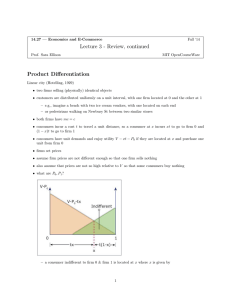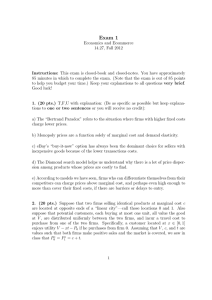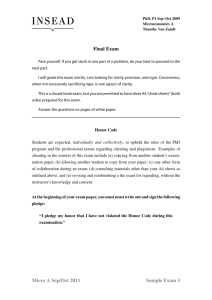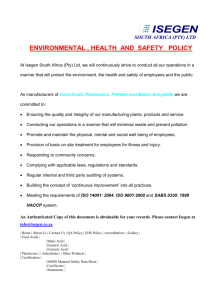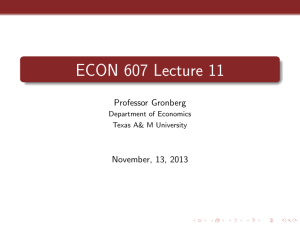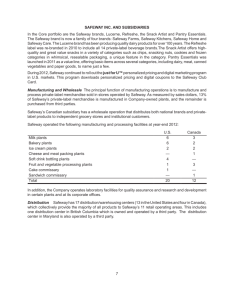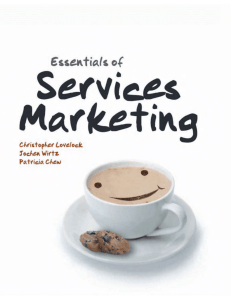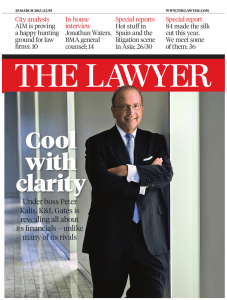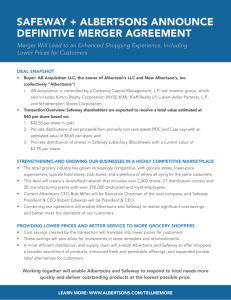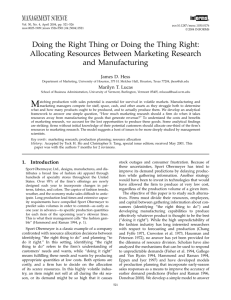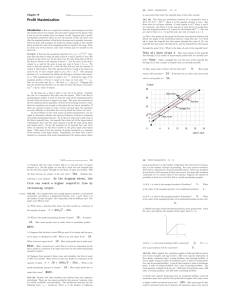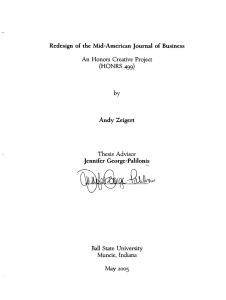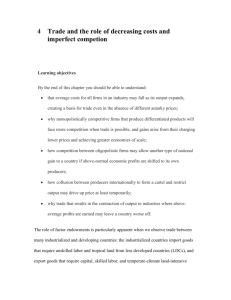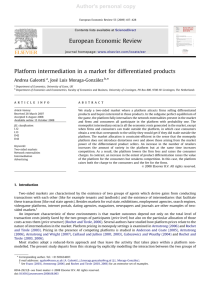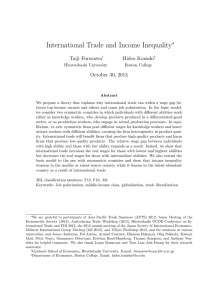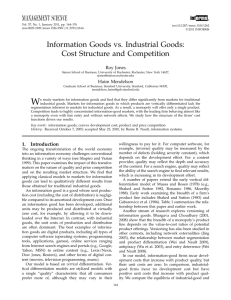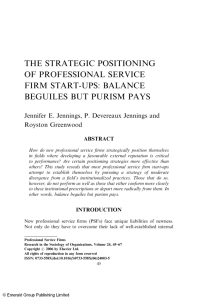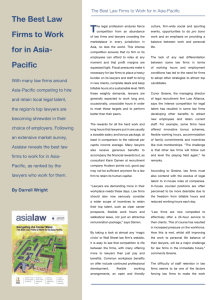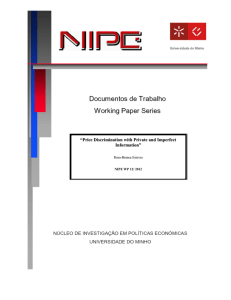A Contrivance to Raise Prices?
advertisement
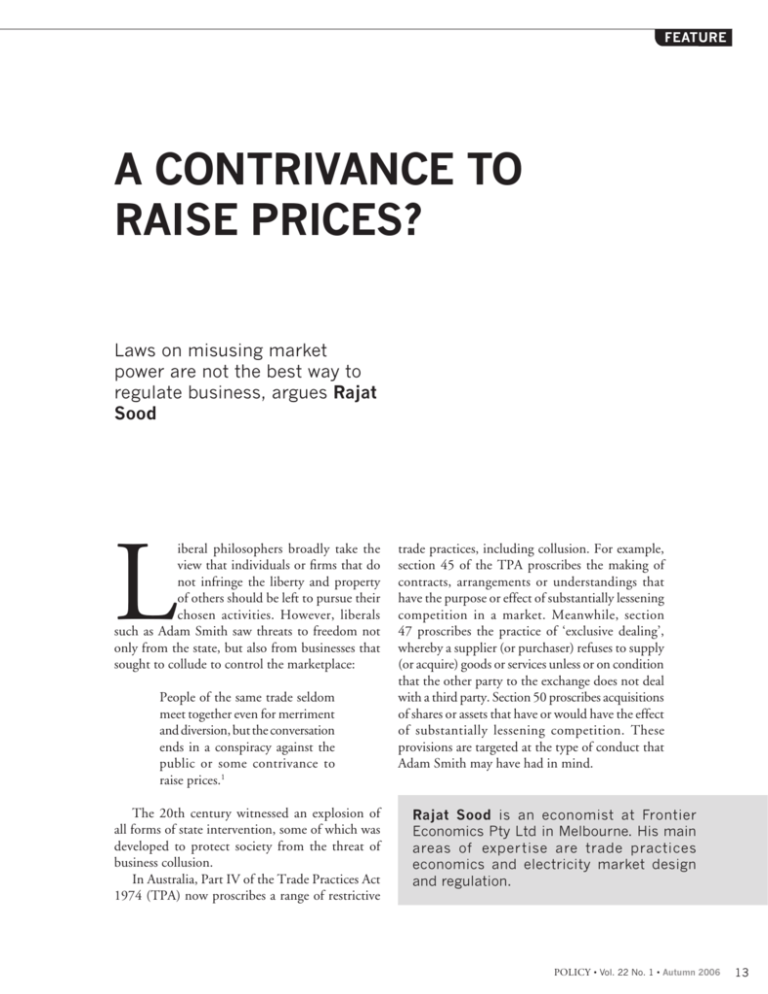
FEATURE A CONTRIVANCE TO RAISE PRICES? Laws on misusing market power are not the best way to regulate business, argues Rajat Sood L iberal philosophers broadly take the view that individuals or firms that do not infringe the liberty and property of others should be left to pursue their chosen activities. However, liberals such as Adam Smith saw threats to freedom not only from the state, but also from businesses that sought to collude to control the marketplace: People of the same trade seldom meet together even for merriment and diversion, but the conversation ends in a conspiracy against the public or some contrivance to raise prices.1 The 20th century witnessed an explosion of all forms of state intervention, some of which was developed to protect society from the threat of business collusion. In Australia, Part IV of the Trade Practices Act 1974 (TPA) now proscribes a range of restrictive trade practices, including collusion. For example, section 45 of the TPA proscribes the making of contracts, arrangements or understandings that have the purpose or effect of substantially lessening competition in a market. Meanwhile, section 47 proscribes the practice of ‘exclusive dealing’, whereby a supplier (or purchaser) refuses to supply (or acquire) goods or services unless or on condition that the other party to the exchange does not deal with a third party. Section 50 proscribes acquisitions of shares or assets that have or would have the effect of substantially lessening competition. These provisions are targeted at the type of conduct that Adam Smith may have had in mind. Rajat Sood is an economist at Frontier Economics Pty Ltd in Melbourne. His main areas of exper tise are trade practices economics and electricity market design and regulation. POLICY • Vol. 22 No. 1 • Autumn 2006 13 A CONTRIVANCE TO RAISE PRICES? However, section 46 of the TPA goes further by proscribing behaviour that may not involve collusion by agreement or acquisition. Instead, the subject of section 46 is popularly known as the ‘misuse of market power’. Section 46(1) provides: A corporation that has a substantial degree of power in a market shall not take advantage of that power for the purpose of: (a) Eliminating or substantially damaging a competitor of the corporation or of a body corporate that is related to the corporation in that or any other market; (b) Preventing the entry of a person into that or any other market; or (c) Deterring or preventing a person from engaging in competitive conduct in that or any other market. The key contention of this article is that Section 46 imposes obligations that are unjustified and undesirable in a liberal society. Conduct targeted by section 46 Courts have taken the view that section 46 is not designed to deter dominant firms from competing, but rather to protect competition for the benefit of consumers. As observed by the High Court of Australia in the leading case of Queensland Wire: [T]he object of section 46 is to protect consumers, the operation of the section being predicated on the assumption that competition is a means to that end. Competition by its very nature is deliberate and ruthless. Competitors jockey for sales, the more effective competitors injuring the less effective by taking sales away. Competitors almost always try to ‘injure’ each other in this way. This competition has never been a tort… and these injuries are an inevitable consequence of the competition section 46 is designed to foster.2 To establish a breach of section 46, it is not enough to show the coexistence of market power, conduct and a proscribed purpose.3 The behaviour 14 Vol. 22 No. 1 • Autumn 2006 • POLICY targeted by section 46 is where a firm takes advantage of its market power to harm competitors or competition. Although there has been some dispute over what ‘taking advantage’ precisely means, there is general agreement that a firm only offends section 46 if it would not have reasonably behaved in the same way had it lacked market power. After all, if the firm would have behaved in a similar way whether or not it had market power, it can hardly be said that the firm took advantage of its market power. Whether or not a firm would have behaved in the same way without having market power often turns on whether the conduct in question increased the efficiency of its operations. If the conduct promoted efficiency, one would expect that firms in a competitive market would behave in a similar way because a firm that did not do everything it could to increase its efficiency in a competitive market would eventually go out of business. Such behaviour would not breach section 46, even if it harmed competitors. However, if the conduct in question did not promote efficiency, it is more likely that a firm without market power would not reasonably behave in a similar way. Consider the situation in Queensland Wire. The firm with market power was BHP and the conduct in question was its refusal to supply an intermediate good— ‘Y-bar’—in the production of ‘star-picket’ fences, commonly used on farms. Chief Justice Mason and Justice Wilson said: In effectively refusing to supply Y-bar to the appellant, BHP is taking advantage of its substantial market power. It is only by virtue of its control of the market and the absence of other suppliers that BHP can afford, in a commercial sense, to withhold Y-bar from the appellant. If BHP lacked that market power—in other words, if it were operating in a competitive market—it is highly unlikely that it would stand by, without any effort to compete, and allow the appellant to secure its supply of Y-bar from a competitor.4 Their honours went on to say: …in every steel product line where BHP experienced some competition, it sold that product, but in the case of Y-bar, a product which it alone produced, it refused to sell.5 A CONTRIVANCE TO RAISE PRICES? Similarly, in the Safeway case, 6 Safeway implemented a policy (known as ‘deletion’) whereby it stopped acquiring bread from bakers in response to low retail prices for those bakers’ bread at nearby independent grocers. Safeway argued that the policy was implemented to secure lower prices from its suppliers while the Australian Competition and Consumer Commission (ACCC) argued that the policy was designed to punish bakers for selling cheap bread to independent supermarkets and require the independents to raise their prices. The Full Federal Court found that Safeway had misused its market power because: A firm without market power would not have pursued a policy of deletion because to do so would have produced harm without any countervailing benefit. By contrast, in Melway, 7 the defendant, a producer of street directories, was found not to have breached section 46 by refusing to supply street directories to a particular retailer. According to the evidence, Melway had an established distribution system for its directories whereby it sold only through particular agents. Importantly, Melway had used this distribution system since before it had attained a position of market power. Therefore, the refusal to supply was not due to Melway’s market power, but its desire to maintain an efficient distribution system.8 Implications of section 46 Although few section 46 actions have been ultimately successful in recent years, the provision still raises serious concerns from both a practical and an in-principle perspective. From a practical perspective, section 46 obliges a firm with market power to hypothesise how it would behave if it lacked market power. Specifically, a firm with market power is only permitted to continue with certain strategies—those that are deemed to harm competitors or competition—if they are consistent with the strategy it would have good reason to adopt in a competitive market. Therefore, if a firm wishes to stay on the right side of the law, it must be able to predict, with a reasonable degree of certainty: • whether it has a substantial degree of market power; • whether its strategies will increase profits primarily by increasing efficiency or by harming competitors or competition; • the characteristics of a ‘workably’ competitive market; and • whether and how its strategy might change in such a market. None of these steps is straightforward. The first involves a judgment about a legal conclusion that is often controversial. For example, in its recent judgment in Boral,9 the High Court overturned the Full Federal Court’s finding that Boral had market power in the Melbourne concrete masonry products market. The High Court’s Rural Press judgment also confirmed that having financial strength or resources is not the same thing as having market power.10 The second requirement ignores the fact that firms, in formulating their commercial strategies, are primarily concerned with how to increase their profits, not their efficiency per se. Efficiency is an abstract economic concept that the managers of many firms would have trouble differentiating from profitability or competitiveness. For example, the offending conduct in the Safeway case was Safeway’s attempt to stop bakeries from supplying bread cheaply to nearby independent stores. Had Safeway been successful, it would have improved its competitive position by lowering the relative wholesale price it paid for bread compared to the price paid by its independent rivals. At the same time, Safeway was able to obtain various promotion allowances from bakeries and to ‘insist’ on bakers providing services such as second deliveries of bread each day and stacking the delivered bread on racks.11 This would also have improved Safeway’s competitive position by lowering its relative cost of operations compared to its rivals. Both strategies were pursued to increase profits. However, the first strategy was unlawful while the second was apparently not. The third and fourth requirements are also problematic. Some firms that could be said to have market power price discriminate between different types of customers. For example, Qantas charges substantially higher fares to customers seeking flexible tickets than those happy with inflexible tickets, even for the same class of travel on the same flight. But many firms operating in competitive markets also price discriminate. Cinemas sell tickets to children and students at lower prices than they do to adults even though each person takes up one seat. Hairdressers charge women higher prices than men for similar types of cuts. It is often far from POLICY • Vol. 22 No. 1 • Autumn 2006 15 A CONTRIVANCE TO RAISE PRICES? clear whether specific conduct is the result of market power or not. Yet a firm can be found in breach of section 46 if it does not carry out this analysis in the proper manner and make the appropriate decision. The result of this situation is that many firms —often far from household names—spend substantial time and resources reacting to threats and claims under section 46. This may now increase in light of the $8 million penalty for breaches of section 46 recently imposed on Safeway by the Federal Court.12 It should be noted that the other provisions of Part IV do not impose such onerous and artificial obligations on firms. Both the section 45 provisions dealing with anti-competitive agreements and the section 50 provisions dealing with acquisitions refer to activities that substantially lessen competition in a market. While it may not be simple for a firm to predict the likely impact of an agreement or acquisition on competition, it is a less abstract exercise than determining how it would react if its market position were different. Firms also tend not to enter agreements with competitors or undertake major acquisitions on a routine basis. But section 46 potentially applies to all aspects of a firm’s conduct towards its competitors, suppliers and customers. Perhaps more important is whether it is reasonable in a liberal society to expect firms to behave in a way that is totally at odds with their actual commercial situation. It may be that BHP and Safeway behaved in ways that they would not have, were they operating in competitive markets. But assuming BHP and Safeway were not operating in competitive markets, how reasonable is it to oblige them to behave as if they were? Generally speaking, under the common law, a defendant’s conduct is judged on the basis of a reasonable person with similar characteristics facing the same circumstances as the defendant. However, section 46 requires a firm to behave as if it faced a different (that is, competitive) market environment to what it actually does face. In effect, it imposes a permanent behavioral obligation on all firms with market power to behave as if they faced the competition they strived to escape. As well as being illogical, this may backfire. The community has a strong long term interest in firms competing vigorously to increase their profits. The High Court in Queensland Wire recognised this. But section 46 effectively says that while firms without market power are generally entitled to do anything 16 Vol. 22 No. 1 • Autumn 2006 • POLICY they can to increase profits, including seeking to injure competitors, firms that have successfully grown to a size where they are found to have market power are not entitled to compete in the same way. As with the repealed anti-price discrimination provision (formerly section 49), section 46 may actually deter firms from engaging in socially desirable behaviour out of fear of prosecution. Again, the record penalties handed out to Safeway are likely to heighten these concerns. Endnotes 1 Adam Smith, An Inquiry into the Nature and Causes of the Wealth of Nations, Vol 1. (Indianapolis: Liberty Classics, first published 1776), Chapter 2, pp.26-27. 2 Queensland Wire Industries Pty Ltd v Broken Hill Pty Co Ltd (1989) 167 CLR 177, at p.191. 3 Melway Publishing Pty Ltd v Robert Hicks Pty Ltd [2001] HCA 13. 4 Queensland Wire, at p.192. 5 Queensland Wire, at p.192. 6 Australian Competition and Consumer Commission v Australian Safeway Stores Pty Limited [2003] FCAFC 149 at para 330. 7 Melway Publishing Pty Ltd v Robert Hicks Pty Ltd [2001] HCA 13. 8 Melway Publishing Pty Ltd v Robert Hicks Pty Ltd [2001] HCA 13 at paras 62 and 68. 9 Boral Besser Masonry Limited v Australian Competition and Consumer Commission [2003] HCA 5 10 Rural Press Ltd v. Australian Competition and Consumer Commission [2003] HCA 75 11 Australian Competition and Consumer Commission v Australian Safeway Stores Pty Limited [2003] FCAFC 149 at para 308. 12 Australian Competition and Consumer Commission v Australian Safeway Stores Pty Limited (No.4) [2006] FCA 21, at para 2. 13 Commonwealth of Australia, Review of the Competition Provisions of the Trade Practices Act, January 2003, chapter 3. 14 Commonwealth of Australia, Senate Economics References Committee, The effectiveness of the Trade Practices Act 1974 in protecting small business, March 2004.
